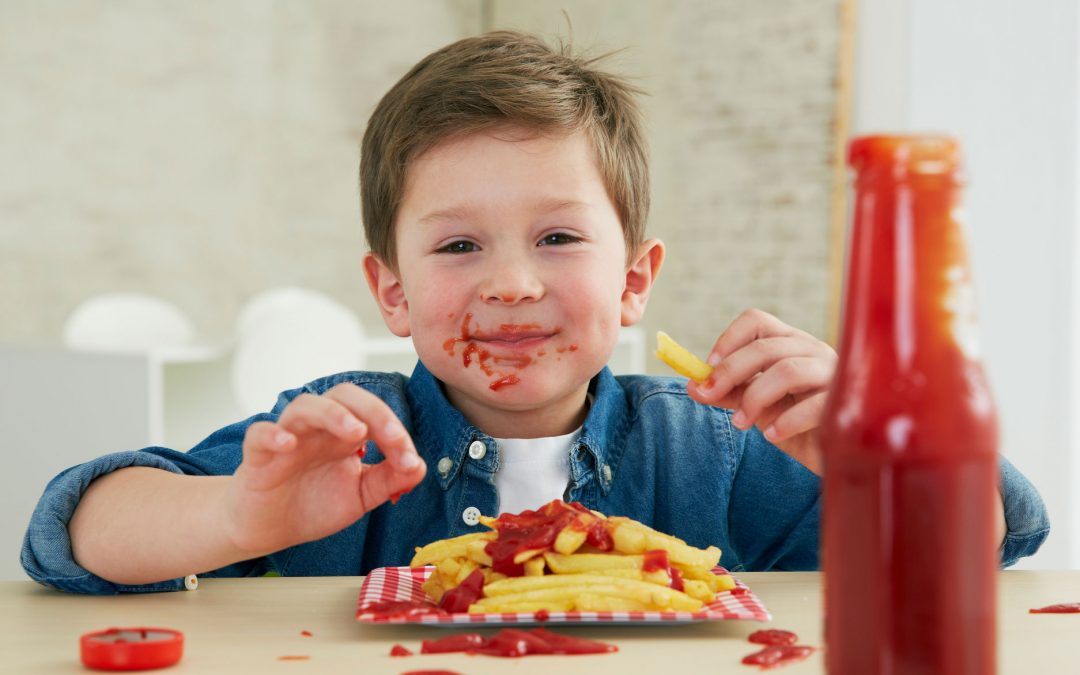We’ve had quite a few questions about how to navigate children serving themselves condiments such as ketchup, sugar, maple syrup and honey. Here are some of the questions and our answers:
My daughter (5yo) loves condiments like salad dressing and ketchup. She consumes way too much of them in order to eat carrots or hamburgers. We let her take some and some days, it is a reasonable amount and other days not. Should this be restricted?
We do family style meals and let her serve herself, but she often takes too much and leaves it and it is then wasted. Anything we can do here?
We are assuming that you are following the division of responsibility in feeding, where you do the what, when, and where of structured meals and snacks and let your daughter do the how much and whether of eating. Is the concern that she is eating too much salad dressing or ketchup? Then it is better leave her alone to determine how much condiment to use. Being a child, all food represents new learning, and she is using familiar condiments to allow the food to taste more familiar and enjoyable. Over time, the amount of condiments she eats will moderate. Or is the concern truly waste? Truly? We press this point because concern that a child is eating too much frequently gets disguised as concern about food waste. Keep in mind that with feeding kids, waste is inevitable. Consider serving the condiment in a way that makes it easier for your child to manage quantities, such as in a small squeeze bottle or dish with a spoon. Reassure her she can always go back for more.
Okay, what about this. Say, when having oatmeal or pancakes, should children be responsible for choosing how much sugar or syrup goes on top? Is it better to provide the serving container and let them choose, or should parents take the approach of dessert and serve them a limited portion with the meal for the child to use as they wish?
We encourage being brave and letting them put on as much sugar or other topping that they want. They are learning to enjoy the flavor of the cereal or pancakes by toning it down a bit with the topping. Over time, they are likely to eat less topping. Or not. Kids who have been exposed regularly enough to sweets to take the specialness out of them are relaxed about sweet toppings, as well. Being relaxed about sweets means they will eat fewer when their energy needs are low, more when their energy needs are high. We must confess, however, with expensive maple syrup we encourage them to put some in a small bowl so they can add it as needed.
The other day I let my toddler put as much chocolate sauce in his milk as he wanted. He put in a half inch and exclaimed it wasn’t milk anymore, it was chocolate! Then he just wasn’t able to finish it because it was so rich. The next day he wanted to do it again, but I said he could just have the regular chocolate milk that I usually make. No big fuss cuz I had prevented it from becoming a “forbidden food” the day before.
We love it! It so demonstrates children’s amazing ability to figure things out for themselves.
My daughter will frequently request ketchup for her bread, then eat only ketchup sandwiches and ignore the rest of the meal. It seems like allowing ketchup every time there is bread is turning into an “alternate meal” for her, and her palate and food variety is shrinking. Perhaps it is over-concern on our part, perhaps it is something we should let run its course and see if she moves past it?
Kids, kids. To her it is just food. As your daughter eats her ketchup sandwiches, she is learning to eat unfamiliar foods by simply seeing you eat and enjoy them. Restricting ketchup would amount to pressure, which would decrease her food variety. We recommend your following your own hunch: Be matter-of-fact about it and let it run its course. Keep yourself in control of the menu by putting the ketchup on the table every meal, not having her ask for it and you having to decide yes or no.


Are any of these recommendations backed by evidence? My brother was allowed to eat as much sweets and junk food as he wanted and now, as a 31 year old, his diet is primarily junk food and sweets. He wasn’t forced to eat the healthy on the table and he never chose to. Hence, the recommendations on your website make me very uncomfortable.
Hi Monica
There is much research and evidence for the Satter feeding model. From what you have said, it sounds like your brother wasn’t fed according to the Satter Division of Responsibility. Parents choose which foods to offer at set mealtimes. So if parents don’t want their child to fill up on sweets, they don’t offer them as part of a meal. Also, the parent chooses when mealtimes and sit-down snacks are served. This means that children don’t have free access to the fridge or pantry whenever they want.
So that children learn to be calm and not gorge on sweets and junk food when they get the opportunity, we recommend that these foods are offered on a regular basis – maybe once or twice a week – in an unlimited amount at a snack time. There would be other foods available at the same snack time as well. For example, a parent might offer a big bowl of potato crips as well as fruit and milk. So each child can eat as much of what is on offer as long as they share it with others at the table.
https://www.ellynsatterinstitute.org/family-meals-focus/92-managing-junk-food-aka-sweets-chips-sodas/
This article has research references.